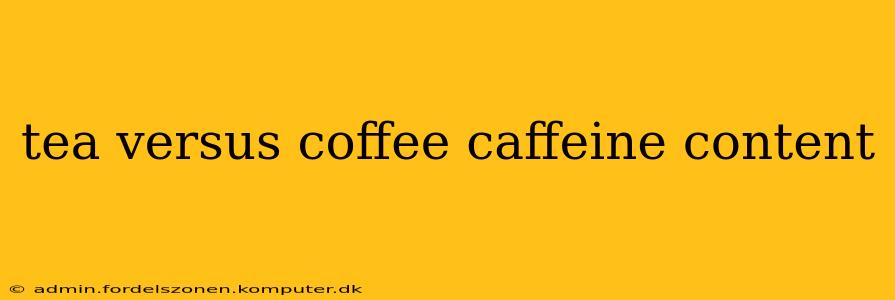The age-old debate: tea or coffee? Beyond personal preference, a key difference lies in their caffeine content. While both offer a stimulating boost, understanding the variations can help you choose the perfect pick-me-up for your needs. This in-depth comparison explores the caffeine levels in different types of tea and coffee, along with factors influencing caffeine intake.
How Much Caffeine is in a Cup of Tea?
The caffeine content in tea varies significantly depending on several factors:
-
Type of Tea: Black tea generally contains the most caffeine, followed by green tea, white tea, and herbal teas (which typically contain little to no caffeine). The processing methods used for each tea type influence the final caffeine concentration.
-
Steep Time: Longer steeping times generally extract more caffeine. A longer steep increases the concentration of other compounds as well, altering taste and potentially leading to a more bitter brew.
-
Amount of Tea Leaves: Using more tea leaves per cup will naturally lead to a higher caffeine concentration.
-
Brewing Temperature: Higher water temperatures can extract more caffeine, however, excessively high temperatures can also lead to a bitter taste.
General Caffeine Ranges (per 8-ounce cup):
- Black Tea: 47-70 mg
- Green Tea: 25-40 mg
- White Tea: 15-30 mg
- Herbal Tea: 0-10 mg (varies greatly depending on herbs used. Some herbal teas can have caffeine from added ingredients)
How Much Caffeine is in a Cup of Coffee?
Similar to tea, the caffeine content of coffee depends on multiple factors:
-
Type of Coffee Bean: Arabica beans generally have a lower caffeine content than Robusta beans. The bean variety significantly impacts caffeine levels.
-
Brewing Method: Different brewing methods extract varying amounts of caffeine. Espresso generally contains a higher concentration per ounce than drip coffee.
-
Roast Level: While it's a common misconception, roast level has minimal impact on caffeine content. Darker roasts might have slightly less caffeine but this is usually negligible.
-
Bean Size/Grind Size: Finer grinds may extract slightly more caffeine, but the differences are typically not significant.
General Caffeine Ranges (per 8-ounce cup):
- Drip Coffee: 70-140 mg
- Espresso: 60-75 mg (per shot, so a double shot will have more caffeine).
Which Has More Caffeine: Tea or Coffee?
Generally speaking, coffee tends to have more caffeine than tea. However, the significant variations within both coffee and tea make it impossible to make a blanket statement. A strong cup of black tea can certainly pack a caffeine punch, and a weak cup of coffee might have less caffeine than a strong cup of black tea.
Does Decaf Tea or Coffee Still Contain Caffeine?
Yes, both decaf tea and decaf coffee still contain small amounts of caffeine. The decaffeination process removes the majority of caffeine, but a small residual amount typically remains. Expect significantly less caffeine than their regular counterparts, but not a complete absence.
Is Caffeine Content the Only Factor?
While caffeine content is a key difference, many other factors influence the choice between tea and coffee. These include personal preference for taste, the potential health benefits of each beverage (both containing antioxidants), and individual sensitivities to caffeine.
What are the Health Effects of Caffeine?
Caffeine is a stimulant and can impact your body in several ways. Benefits can include increased alertness, improved mood, and enhanced physical performance, but excessive consumption can lead to anxiety, insomnia, and digestive issues. Moderation is key.
This comprehensive guide provides a better understanding of the caffeine content in tea and coffee, enabling a more informed decision based on your needs and preferences. Remember that these are general ranges, and individual experiences may vary. Consult a healthcare professional if you have concerns about your caffeine intake.
